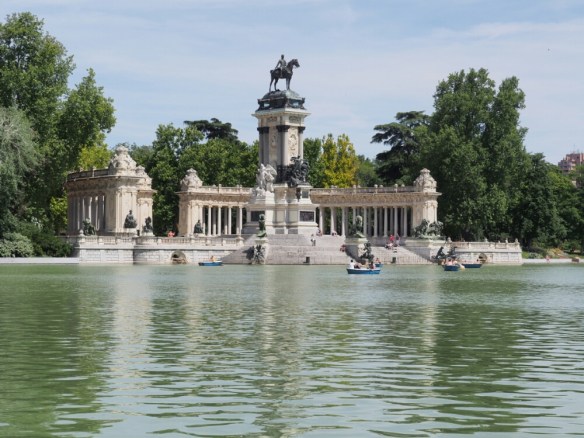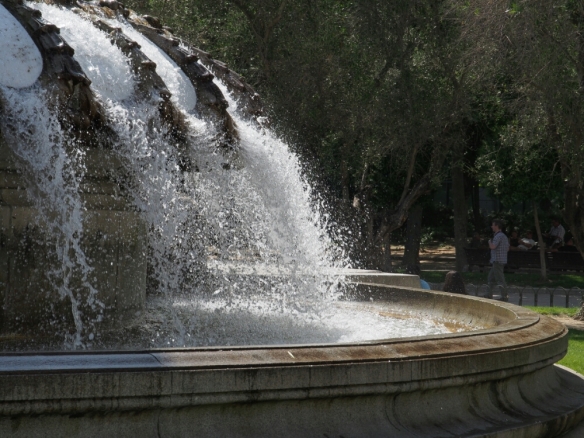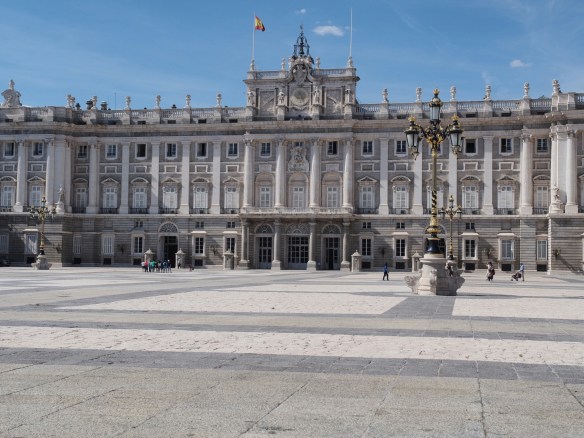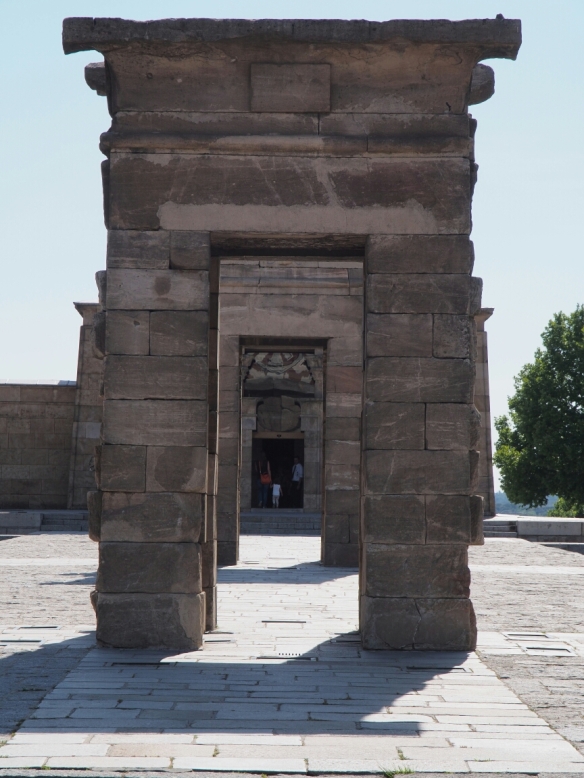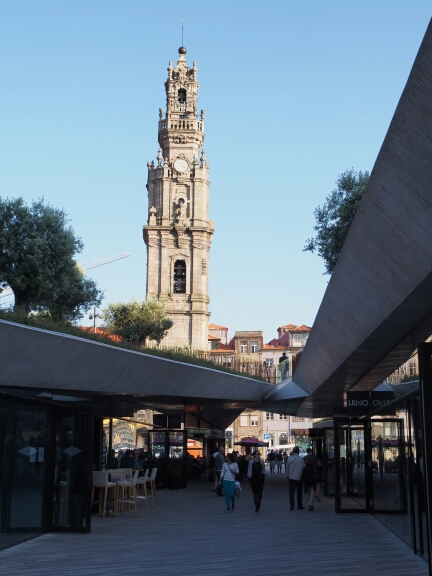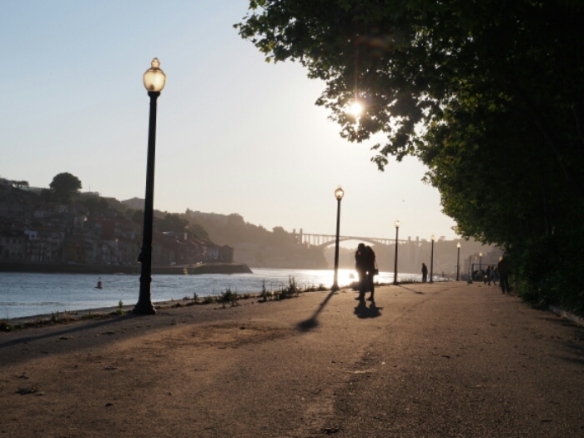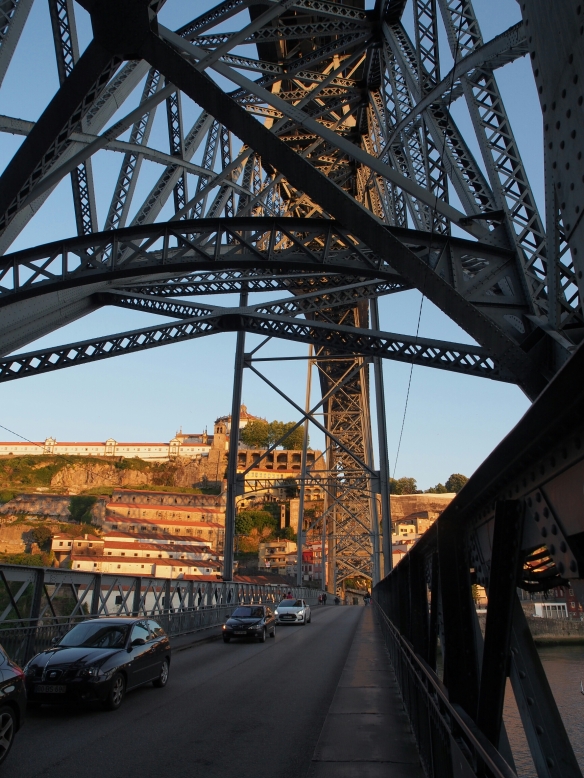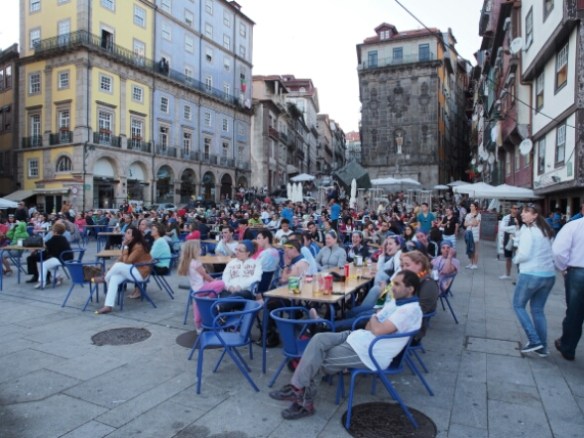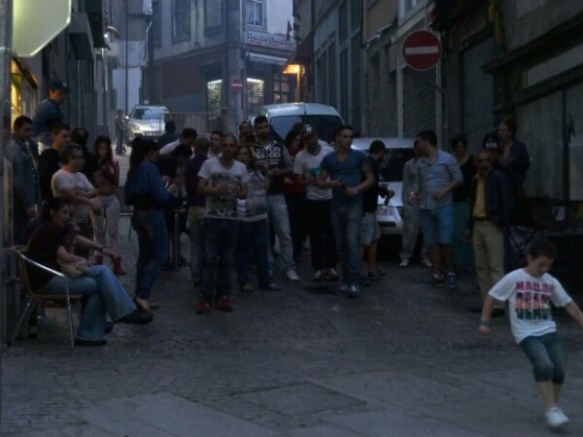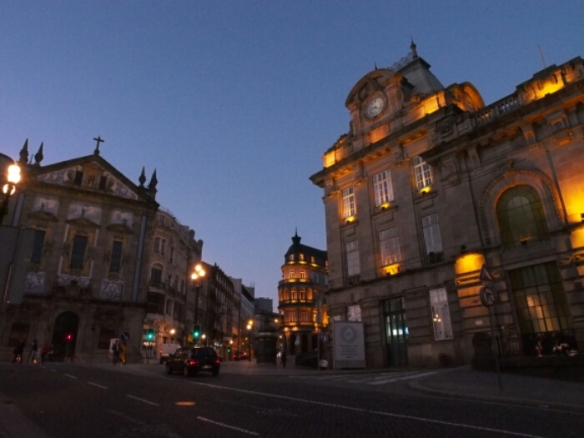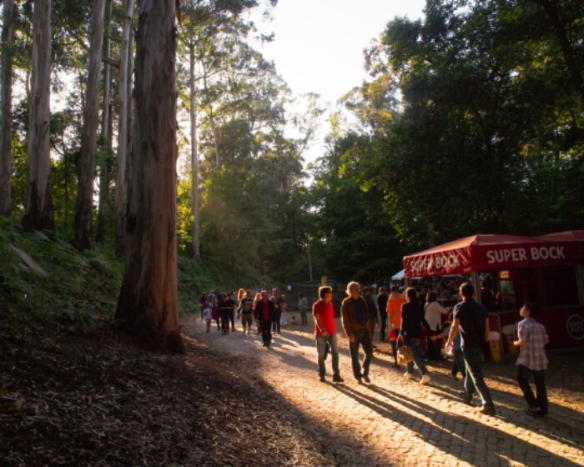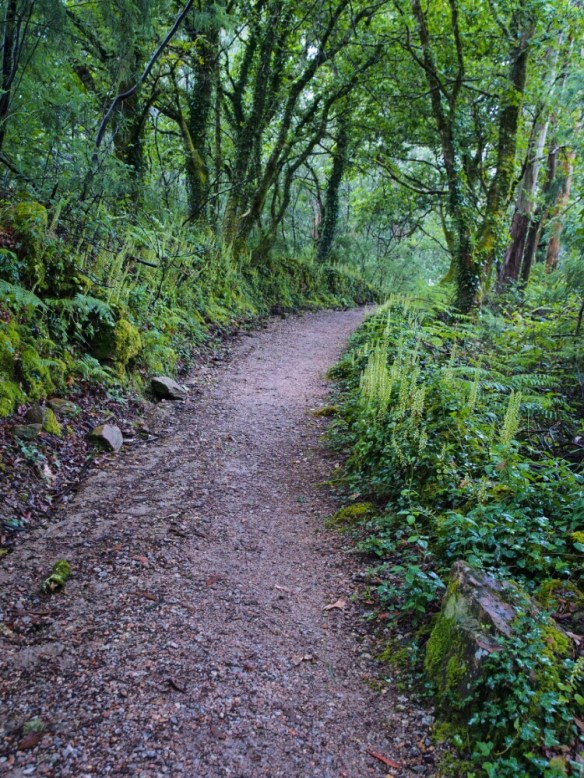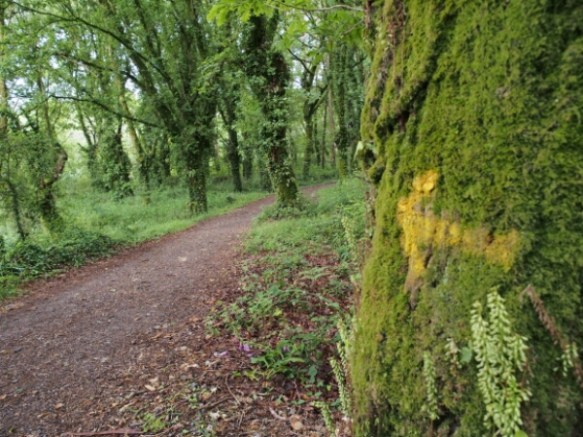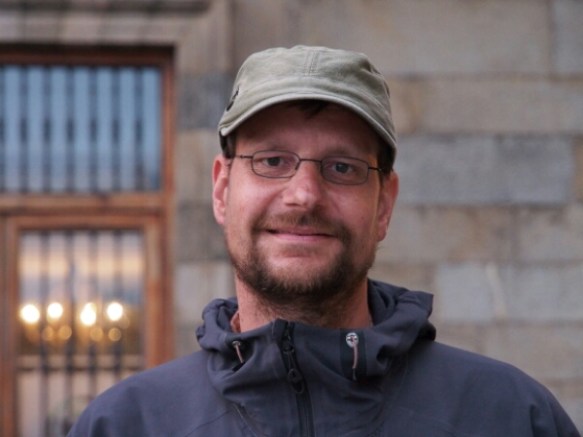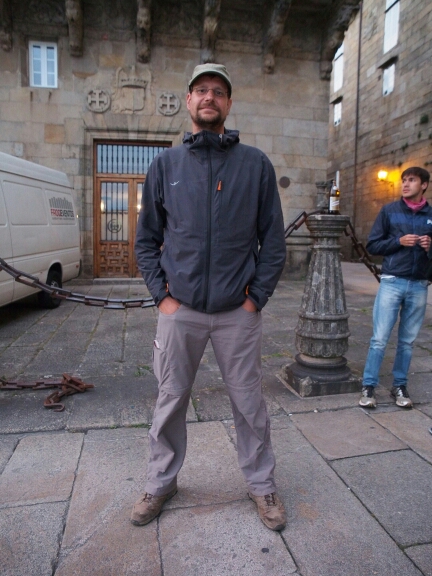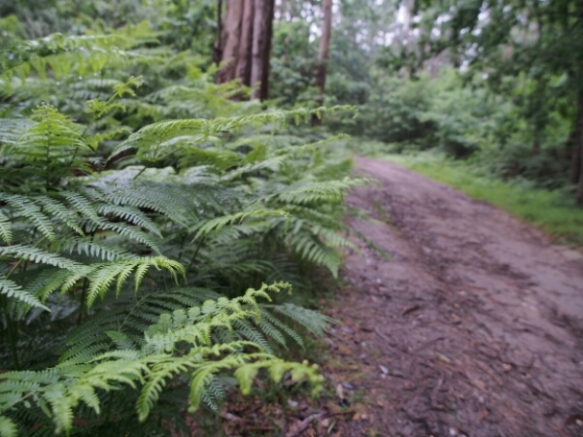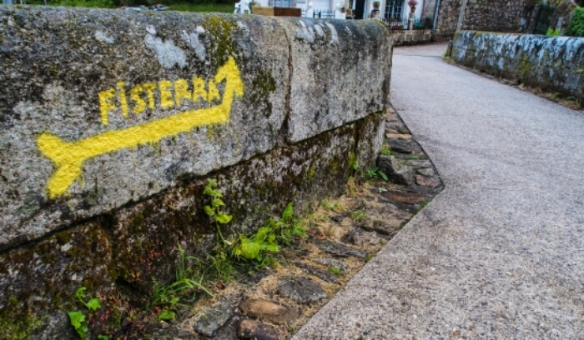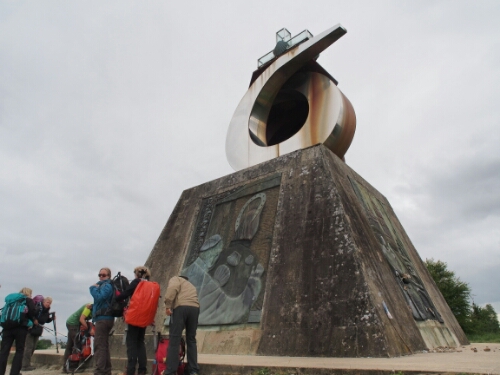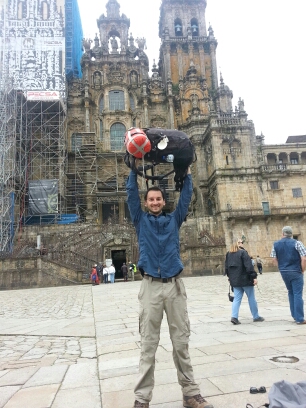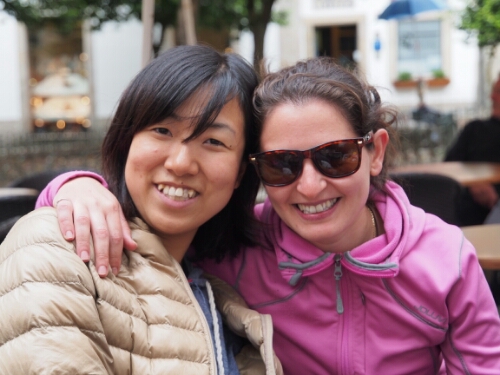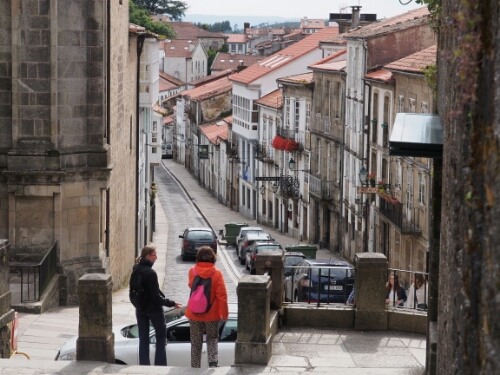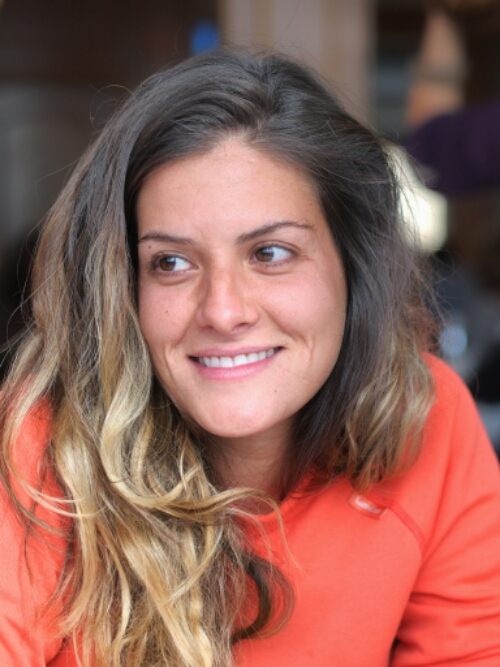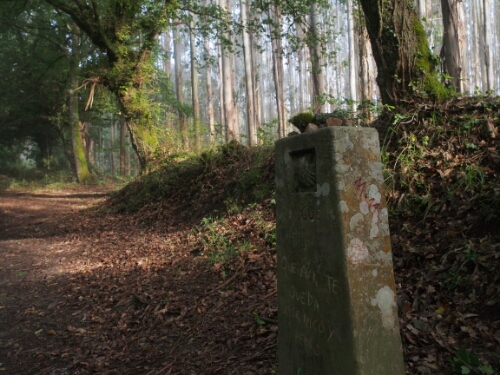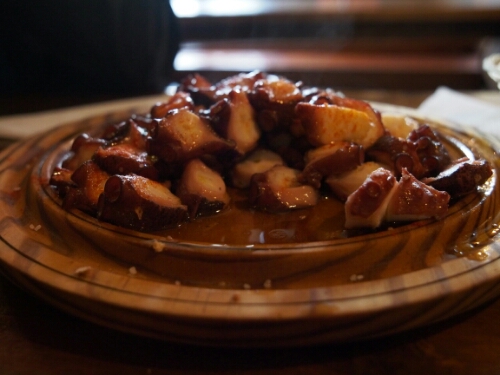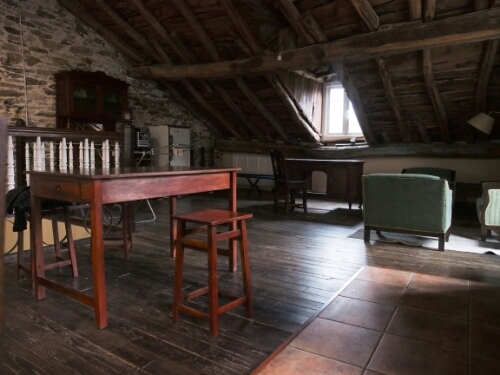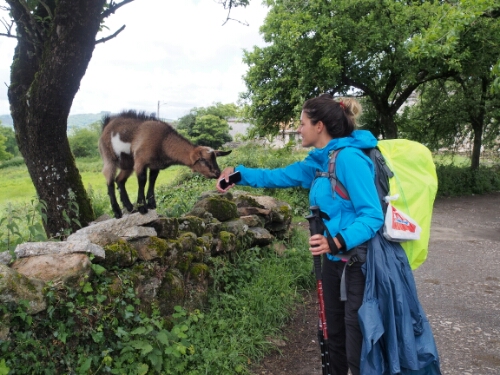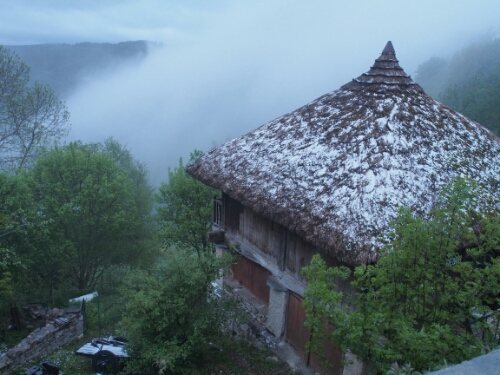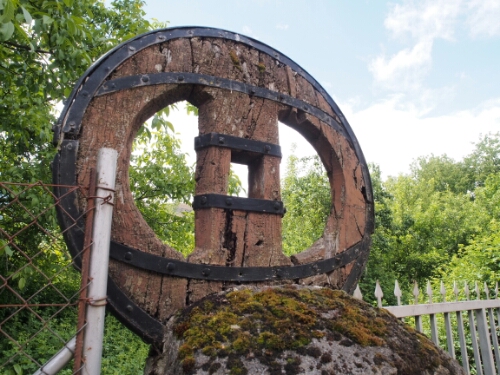Sunday, June 1
Yesterday, for the first time in 33 days, I let a vehicle move me from one place to another instead of my own two feet.
But let’s start the day before that, when my Camino ended.
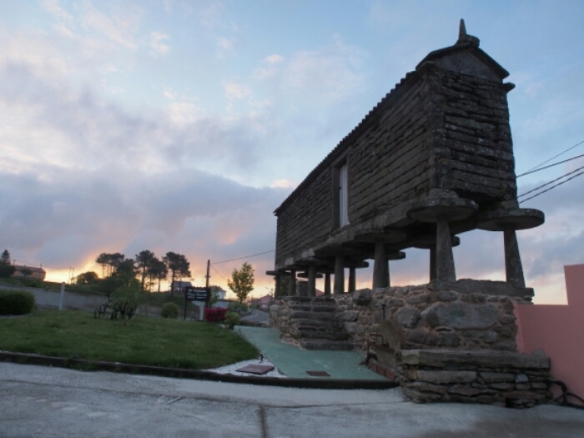
I woke early in Olveira and went to the café for coffee and toast. Bernie and Debbie were there also (everyone was, it’s the café owned by the hospitaleros so it’s the closest and easiest place to eat). I said hello, and sat facing the television. The weather report began — clear in Galicia! Well, maybe not clear. But not raining either.
I ate quickly and left as the sun was beginning to push through the clouds on the horizon. In the cool air I walked briskly, but paused often to take photos of Galicia without rain and fog. I wandered off the trail into a field as high as my knees to get a better photo of the landscape against the glow of sun. And I walked back out with shoes and pants wet from the dew. Worth it.
The route was windmills and river canyons, green stones in the water, hilltops and sunlight. And somewhere forward was Fisterra.
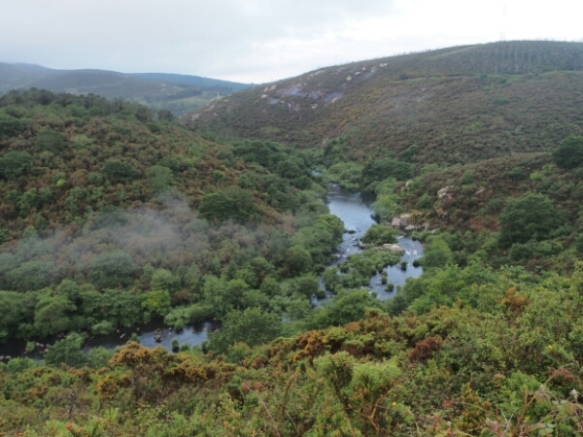
I was about to follow a marker past the last hospital when a woman who worked there called to me and warned me there’d be nothing for 15 more kilometers. So I stopped and had a sandwich and a Coke. Bernie and Debbie were there, and we wished each other a good walk as they stood to go.
Leaving the hospital I began to walk and talk with two Americans, Chris and Duncan, both from St. Louis. Chris is active in the Catholic association on his campus and had organized a group trip from Sarria to Santiago, and afterwards he continued towards Fisterra. Duncan is a friend of his who came on his own to join him.
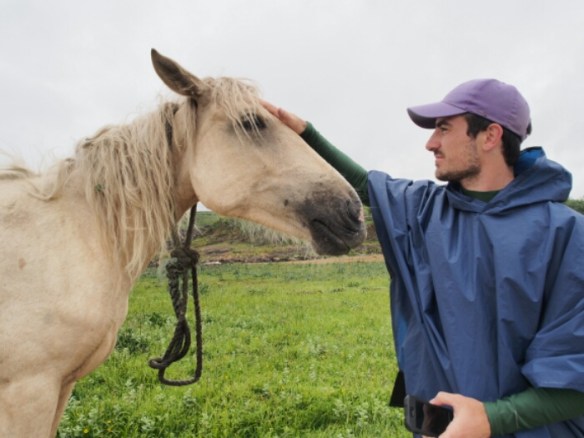
Along the path we found two horses standing, munching grass. One took a quick liking to Chris, responding to scratching behind the ear as gleefully as a dog.
In time Duncan fell behind at a slightly slower pace. Chris and I walked a long way talking, and so the kilometers to the coast passed quickly. We arrived at the top of a hill, where a marker read “To the end.” In front of us we could see the coastline and a few peninsulas. One seemed to extend farther than the other and it had the right shape — it had to be Fisterra.
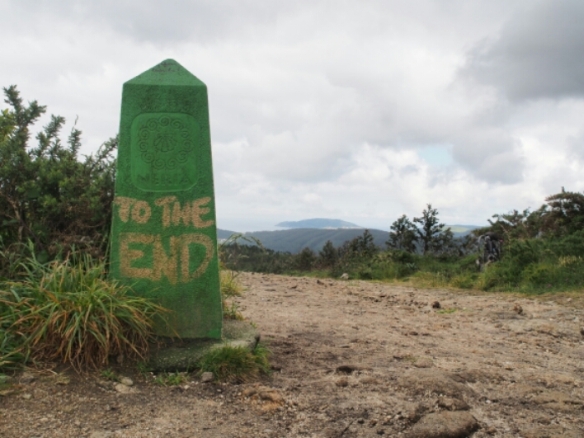
Sitting nearby and enjoying the view was a German I’d seen a few times but not spoken to. Chris knew him (it turns out Chris knows everyone. He’s very outgoing). We chatted a bit and took photos, and Chris decided to stay at the hill and snack a bit. The wind was in my sails; I kept going.
The descent was steep and rocky. I was glad to have my walking staff. I found myself zigzagging across the wide path to find the flattest ground, but at times there was none. Stone to stone in uneven steps. Down and down.
I finally reached flat land again and came upon the first coastal pueblo. As I passed through I saw a dog in the street, near a house with an older woman out front and some chickens. I came towards the dog and reached out, and she shied away, head down. But she didn’t run. I reached my hand out more slowly until she allowed it to touch her. Then she tucked her head away again.
I kept my hand out but brought it back a bit towards me. She stepped forward. A little more and we touched again. Suddenly she was open and affectionate, letting me pet her and pressing up against my leg when I stopped. Sometimes she would back away again, but she always returned.
The old woman had been watching. I smile at her. “Te gustan los perros?” she asked. You like dogs? I replied yes, that wherever I go they are always my friends. I smiled and said goodbye.
As I passed through Cee, I was stopped by two old men. One first tried to guess my language, and he lit up when I responded in Spanish. He started telling me about all the languages he can speak, and telling me about the way the path went and where I could stop to eat. His friend often tried to get a word in without much success. A woman passed by and as she left he told me she was Italian, and he speaks Italian. We said goodbye in every language either of us knows.
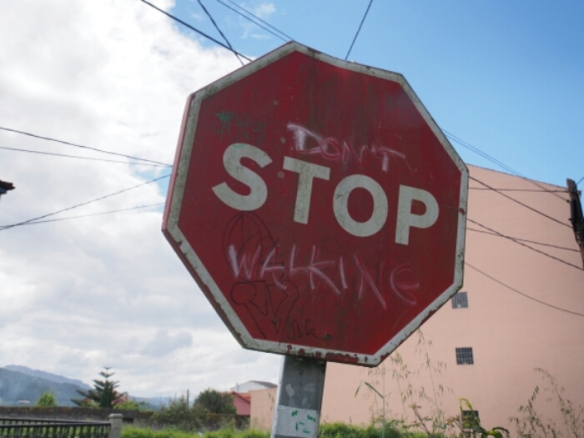
As I left the old men, Bernie and Debbie caught up. We only briefly walked together and discovered suddenly that the Camino was not well marked here. The arrows vanished. I started asking locals which way to go. Bernie and Debbie followed albeit hesitantly. Finally we came to an open park with a view of the ocean, a road along it, and the next pueblo. A local told me to head there to a plaza where I would find arrows again.
Bernie and Debbie stayed behind to snack. We said goodbye. I wouldn’t see them again, it turns out..
I walked to the next pueblo, finding arrows along the coastal road. But within the pueblo they were again poorly marked. Locals directed me towards the church, and another man there pointed me down the correct street which climbed up to the back of the town. Finally there were arrows again. I found myself in a narrow alley, walls covered in vegetation, climbing steeply out of the town and up the hill behind. It took me briefly through the woods until it it came out again to another town and then went on to rejoin a road, then left it again for the hills which offered the best view yet of Fisterra, which still seemed so very far away.
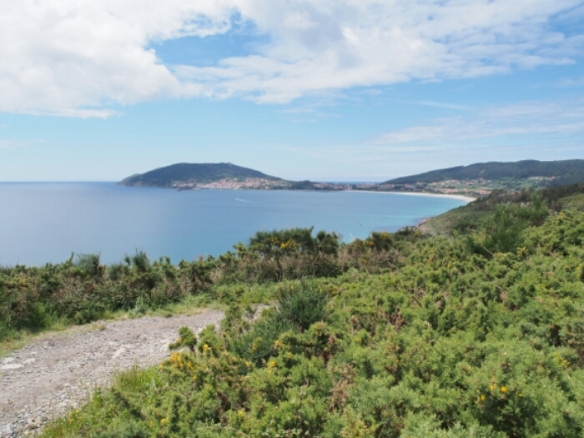
Onward and onward and onward, seemingly forever. Finally, I emerged onto a beach-side path that led into Fisterra. Many pilgrims walked the sand as the path diverged inland, but I wanted to stick to it in case there was anything interesting along it. Eventually the path joined the beach again at a bar, where I found Sven relaxing and enjoying a beer.
He urged me to drop the pack and go enjoy the water, but I was a man on a mission. Many pilgrims seemed to be checking into albergues first and leaving their packs there, planning to go up to the lighthouse another 3km away for sunset. I couldn’t stop. I had to reach the end with my pack on my back and my staff in my hand, so I kept going.
It was the hardest 3 kilometers of my life. I hadn’t sat down since I ate that morning. My feet burned and ached on the asphalt and I could feel that the skin was not doing well. But I couldn’t stop. The street climbed and arced along the hillside until finally I approached the lighthouse, surrounded by tourists and cars and buses. Feelings swelled as the final marker appeared in front of me. 0.00km. People were posing with it, but they stepped away as I got closer.
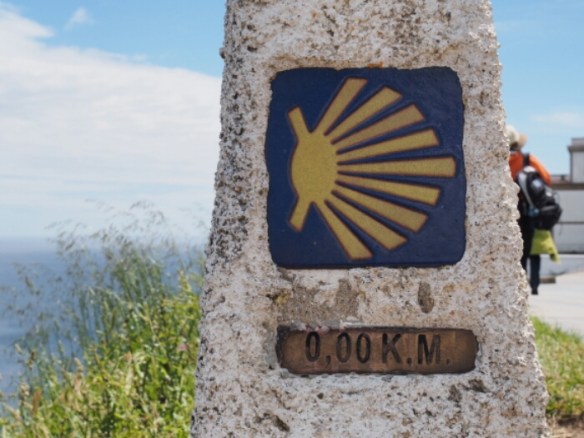
I reached out with my hand to touch it, to make it real, and sat down on an angled stone in front of it. Not so much sitting as collapsing. My head down, I took some time to just be there, exhausted, at the end.
I heard the click of cell phone cameras behind me. I guess the tired pilgrim at the end of his journey makes for a photogenic moment.
But the stone wasn’t really at the end. The lighthouse was behind it. And behind that, the cliffs. I stood, took a few photos of the stone and with it. I kept going.
On the cliffs I found many people, some of them burning articles of clothing or paper on an altar that bore a cross, or on the rocks nearby.
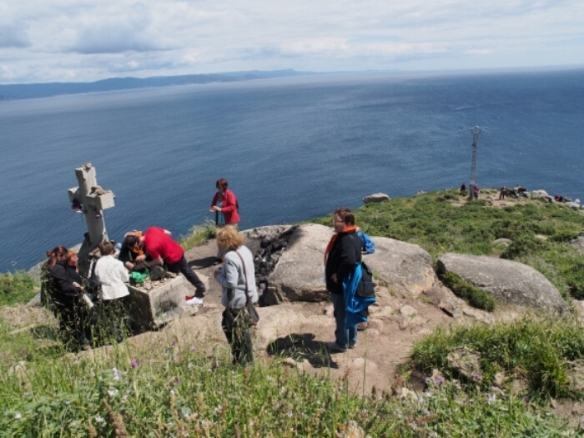
I descended as far as I could, my feet sending my brain constant and painful status updates. Shut up, we’re nearly there.
I found a boulder that was as far as I could safely go with my bulky pack, and sat. The end of the world at last. The end of the Camino, 33 days and hundreds upon hundreds of kilometers from the beginning.
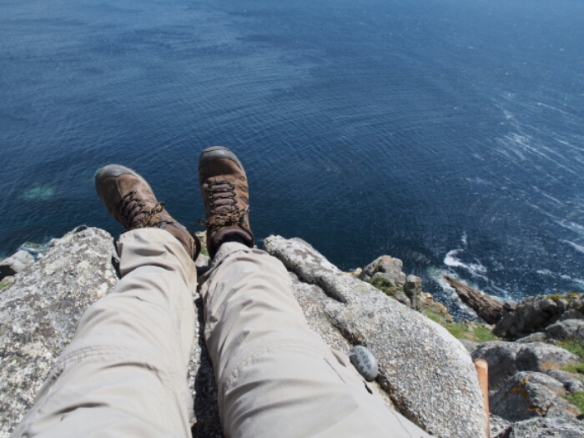
Eventually I stood again and climbed to a rock closer to the lighthouse. I took off my right boot to see what my foot was complaining about. Not good. A new blister, and a lot of damaged skin. An old French woman walked over to see how I was, frowning a motherly frown as she looked at my foot. She offered water but I assured her I had some.
I was the only one there with all my belongings, and people noticed. Another woman came over to me and offered me food that looked a bit like a date. I accepted it with thanks. I was very hungry.
After bandaging my foot a bit I put my boot back on and endured the 3 kilometers back to town. I found an albergue and a supermarket where I could buy some foot cream to help heal the skin, and took some time to shower and relax.
But not too much time. I wanted to go back up for the sunset. I ate at a nearby bar; pulpo, razor clams, and chipirrones.
I really do think a pulperia would do well in Los Angeles.
At around 8:30 I left for the lighthouse, arriving about an hour before sunset. I climbed back down to the boulder I’d sat at earlier and stayed there for a while taking photos and video and enjoying the warmth. Nearby I saw three wild goats approach, munching on the grass. There wasn’t much room on the cliffs and normally there are many people here, so I was surprised to see animals. More photos and video, of course.
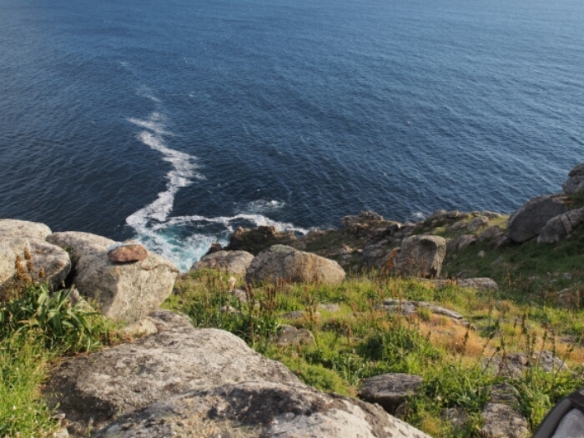
I climbed back up and found a boulder with a good view of both the sunset and the people watching it. Next to me were a pair of boots with a small bouquet in them; a recent tribute to the end of someone else’s journey
The crowd was growing. I heard a lot of German and Korean and a bit of French. But I didn’t see Sven or Kasumi as I’d expected to. Maybe Kasumi went the Muxia way, or maybe she didn’t do Fisterra in 3 days. Sven must’ve stayed in town, I suppose.
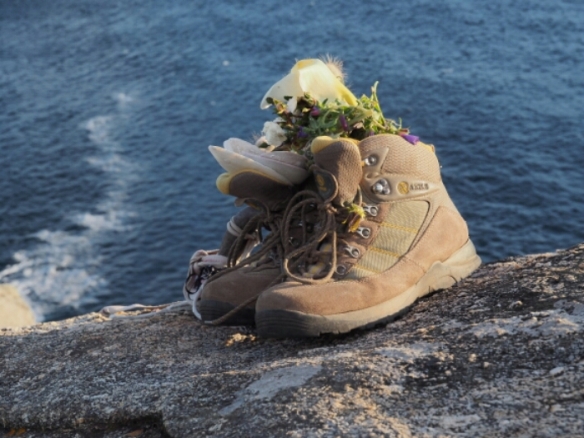
As sunset neared I saw Chris and Duncan and called out to them. They came over to my boulder and said hello, as did the German from earlier, whose name I learned was Markus. He had started about 100km farther back than me, deeper in France. So for him, this sunset was even more significant. I took video as the sun dipped. The guys passed around a bottle of wine. The lighthouse lit up, and we began walking back under the sliver of the waxing crescent moon.
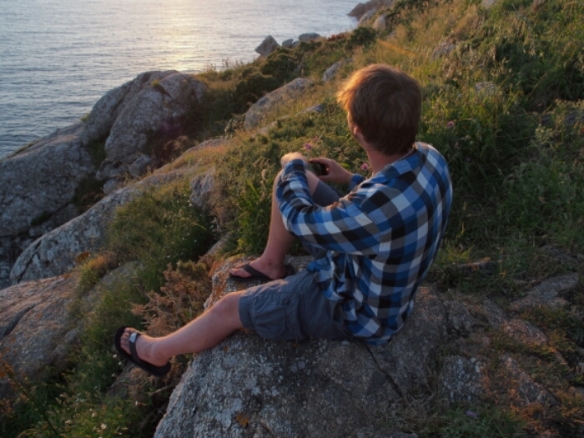
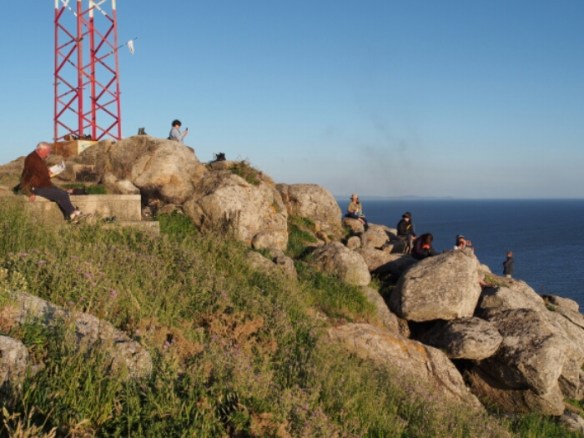
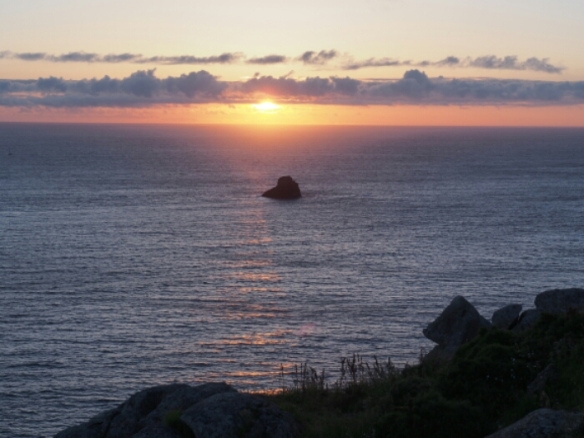
I was glad not to be alone at the end.
Back in town we went a bar where live music was set to go on at midnight. Which means it actually went on at 12:45, because Spain. We drank some beers. Most of the guys were half asleep. As we sat we saw the cute hospitalera from the municipal walk in with her friend, and Chris and I went over to chat with them. The musicians finally started playing; something in between rock and flamenco.
Soon after, we saw that the rest of the guys were getting up to go. We said goodbye to the girls and left.
Chris turned to Duncan and told him it was time to go for a dip in the harbor. Duncan cursed him but followed. I’m blessedly immune to most peer pressure at this point, but I came along to see if they’d really go into the frigid water on a cold night.
Sure enough, they did. They stripped off and Chris charged ahead into the shallow water near the boats, and Duncan followed. A few moments later they came back out, dressed, and we walked back towards the municipal. I said goodnight to them as they entered, and continued to my albergue farther on.
The next morning I woke, had breakfast, and boarded a bus to Santiago and then Porto on a whim. I’ll save all that for the next post.
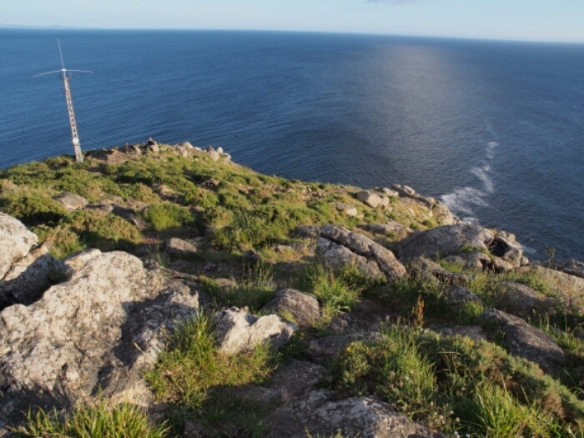
-Daniel

